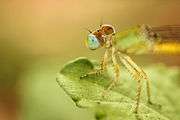Ischnura heterosticta
| Ischnura heterosticta | |
|---|---|
.jpg) | |
| Male Ischnura heterosticta | |
 | |
| Female Ischnura heterosticta | |
| Scientific classification | |
| Kingdom: | Animalia |
| Phylum: | Arthropoda |
| Class: | Insecta |
| Order: | Odonata |
| Suborder: | Zygoptera |
| Family: | Coenagrionidae |
| Genus: | Ischnura |
| Species: | I. heterosticta |
| Binomial name | |
| Ischnura heterosticta (Burmeister, 1842)[1] | |
Ischnura heterosticta, one of at least two species with the common name common bluetail, is a common Australian damselfly of the family Coenagrionidae.[2] It is the largest of the six Ischnura species in Australia.[3] They are generally found near slow-running or still water.[4] The species is also salt tolerant.[5] It flies from October to March.[3]
Description
The common bluetail is a small damselfly. Most males have blue eyes, a blue thorax, and a blue ringed tail. The females have a variety of forms including green, brown, black, and a form with very similar colourings to the male.[3][6]
Distribution
In Australia, it is found throughout the entire continent including Tasmania.[7]
Gallery
 Female, brown form
Female, brown form Female, blue form
Female, blue form Head of the damselfly
Head of the damselfly.jpg) Female wings
Female wings.jpg) Male wings
Male wings
References
| Wikimedia Commons has media related to Ischnura heterosticta. |
| Wikispecies has information related to: Ischnura heterosticta |
- ↑ Burmeister, Hermann (1839). Handbuch der Entomologie (in Latin). Berlin: T.C.F. Enslin. pp. 805-862 [820] – via Biodiversity Heritage Library.
- ↑ "Species Ischnura heterosticta (Burmeister, 1842)". Australian Faunal Directory. Australian Biological Resources Study. 2012. Retrieved 8 April 2017.
- 1 2 3 Tillyard, R J (1905). "On dimorphism in the female of Ischnura heterosticta, Burm". Proceedings of the Linnean Society of New South Wales. 30: 302–306.
- ↑ "Common Bluetail Damselfly - Ischnura heterosticta". brisbaneinsects.com. Retrieved 26 August 2015.
- ↑ Kefford, Ben J. (2005-08-22). "Growth of the damselfly Ischnura heterosticta is better in saline water than freshwater" (PDF). Archived from the original (PDF) on August 30, 2007. Retrieved 2008-12-28.
- ↑ "Ischnura heterosticta (Common Bluetail) - Damselfly Photo Gallery". rnr.id.au. Retrieved 26 August 2015.
- ↑ Theischinger, Gunther; Hawking, John (2006). The Complete Field Guide to Dragonflies of Australia. Collingwood Vic.: CSIRO. p. 92. ISBN 0643090738.
This article is issued from
Wikipedia.
The text is licensed under Creative Commons - Attribution - Sharealike.
Additional terms may apply for the media files.